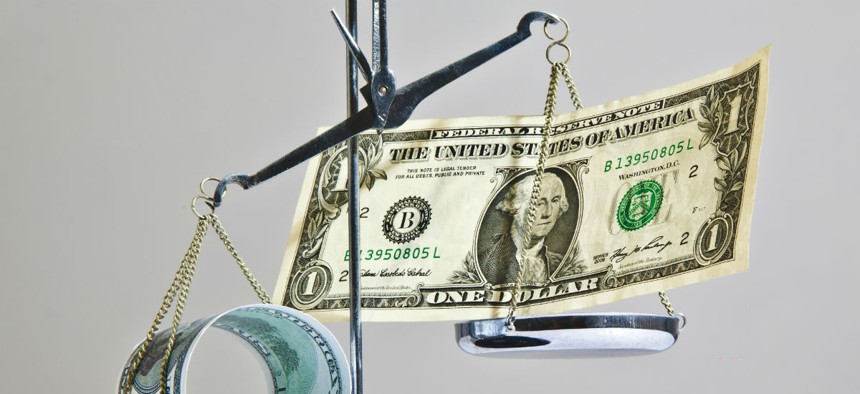
maradon 333 / Shutterstock.com
Last-Ditch Effort for a COLA Increase, a Spending Hike for a Popular Perk and More
A weekly roundup of pay and benefits news.
Federal retirees last week officially learned what many had likely already feared: there will be no cost-of-living adjustment next year. At least one lawmaker wants to change that, though it’s unclear how far his efforts will get.
Rep. Alan Grayson, D-Fla., introduced a bill (H.R. 3761) that would grant retirees a 2.9 percent COLA for 2016. That is more than retirees have received in most recent years. The 2015 COLA was 1.7 percent, and the 2014 increase was 1.5 percent. Retirees did receive a 3.6 percent boost in 2012.
The Seniors Deserve a Raise Act would also change the consumer price index used to calculate the COLA in future years to one that more accurately reflects items on which the elderly spend money, such as health care, Grayson said. Specifically, the COLA would be based on the change in the Consumer Price Index for the Elderly (CPI-E) rather than the Consumer Price Index for Urban Wage Earners and Clerical Workers (CPI-W). Using the CPI-E over the past 39 years would have generated $388 billion more in payments to seniors, according to the Congressional Research Service, Grayson said.
“Simply put, most of our parents and grandparents desperately need a raise,” Grayson said in a statement on the bill. “And they clearly deserve one … [They] are seeing their costs rise – their Social Security payments need to rise as well.”
Current federal employees are on track for a 1.3 percent pay raise in 2016, but they have a lot to worry about before that kicks in. The Treasury Department moved up the deadline for increasing the debt limit to Nov. 3. Outgoing House Speaker John Boehner, R-Ohio, is reportedly planning to move on a clean debt limit increase before he retires from his post and Congress on Oct. 30, but it remains to be seen how that will play out and what will happen in the Senate.
Meanwhile, there is the matter of the continuing resolution that currently is tiding agencies over until Dec. 11. President Obama has said he won’t sign another stopgap spending measure, so lawmakers will need to come up with a budget deal by the December deadline or the government will shut down.
So what would be worse for feds: a shutdown, or a failure to raise the debt limit? Neither would be good, but last week we reported that federal employees would feel the effects of a shutdown more immediately. A shutdown would result in unpaid furloughs for “nonessential” employees starting on Day 1, and delayed paychecks even for those who are required to report to work (absent congressional action).
“Failing to raise the debt ceiling would not bring the government to a screeching halt the way that not passing appropriations bills would,” said a 1995 report from the Congressional Budget Office. “Employees would not be sent home, and checks would continue to be issued. If the Treasury was low on cash, however, there could be delays in honoring checks and disruptions in the normal flow of government services.”
Exceeding the debt limit would have long-term economic consequences, however, and federal employees would not be immune to those. The bottom line: federal workers don’t want either a shutdown or debt ceiling fiasco.
In one piece of brighter news, the government is handing out more money as part of a relatively rare but popular benefit, the Office of Personnel Management reported. Thirty-three agencies awarded more than $58.7 million in student loan repayment benefits to 8,469 federal employees in 2014, OPM said. That’s more than a 15 percent increase from 2013 in the number of employees receiving the benefit, and an 11 percent boost in agencies’ overall investment in the incentive.
(Image via maradon 333 / Shutterstock.com)






